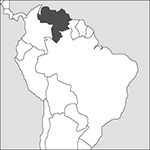A country on the north coast of South America, with a coastline on the Caribbean Sea. It is bounded by Colombia on the west, Brazil on the south, and Guyana on the east.
Physical
The island-fringed coast of Venezuela is tropical, with lagoons. Much oil is found here, notably around the shallow Lake Maracaibo. At the eastern end of the coast is the swampy delta of the Orinoco River. Inland are the Llanos and the maritime Andes. The Guyana Highlands lie in the south of the country and rise to nearly 2750 m (9000 feet), being cut by the valleys of the Orinoco’s tributaries and containing the Angel Falls, the highest in the world.
Economy
The Venezuelan economy is dominated by state-owned oil production, which provides one-eighth of GDP but almost all export earnings. Other export industries include bauxite, aluminium, minerals, chemicals, and agricultural products. Principal agricultural products include maize, sorghum, sugar cane, rice, bananas, vegetables, and coffee.
History

Source: MAPS IN MINUTES™ © RH Publications (1997)
Capital:
Caracas
Area:
912,050 sq km (352,144 sq miles)
Population:
28,459,085 (2013 est)
Currency:
1 bolívar fuerte = 100 centimos
Religions:
Roman Catholic 96.0%; Protestant 2.0%
Ethnic Groups:
Spanish; Italian; Portuguese; Arab; German; African; indigenous
Languages:
Spanish (official); Amerindian languages
International Organizations:
UN; OAS; OPEC; Mercosur; Non-Aligned Movement; WTO
Venezuela was visited in 1499 by the explorer Amerigo Vespucci, who gave it its name (‘Little Venice’) after sighting native houses built on stilts on Lake Maracaibo. It was subsequently colonized by the Spanish. By the mid-18th century wealthy Creoles (Spaniards born in the colony) were protesting against trade restrictions imposed by Madrid. It was in its capital Caracas that the Colombian Independence Movement began (1806), resulting in the creation by Simón Bolívar of Gran Colombia. When this collapsed (1829), Venezuela proclaimed itself a republic under its first President, General José Antonio Páez (1830–43), who, while preserving the great estates, provided a strong administration, allowed a free press, and kept the army under control. The period that followed (1843–70) was politically chaotic and violent. Under President Guzmán Blanco (1870–88) moves were made towards democracy, with the first election in 1881, and there was growth in economic activity. Despotic government returned under the Caudillos Cipriano Castro (1899–1908) and Juan Vicente Gómez (1909–35). Oil was discovered before World War I, and by 1920 Venezuela was the world’s leading exporter of oil. Military juntas continued to dominate until Rómulo Betancourt completed a full term as a civilian President (1959–64), to be peacefully succeeded by Dr Raul Leoni (1964–69). Since then, democratic politics have continued to operate, with two parties, Accion Democratica and Christian Democrat, alternating in power, even though extremists of left and right have harassed them with terrorism. A post-war oil boom brought considerable prosperity, but rising population and inflation caused many problems for President Dr Jaime Lusinchi (1983–88). Falling oil prices and increased drug trafficking were additional problems for his successor Carlos Andrés Pérez, who faced serious riots in 1989 for his austerity measures, and two unsuccessful military coup attempts in 1992. In 1993 Pérez was removed from office and charged with corruption. Elections in December of that year saw Rafael Caldera Rodríguez accede to the presidency. In 1998 presidential elections were won by the left-wing populist Lt Col Hugo Chávez Frias, leader of one of the coup attempts in 1992. He was re-elected in 2000, following constitutional changes in 1999, and subsequently survived an attempted coup (2002) and a referendum seeking to remove him from office (2004). Following re-election in 2006 Chavez nationalized the oil industry (2007). He was again re-elected in 2012, but died the next year; Vice President Nicolás Maduro was elected to succeed him. Economic problems led to violent demonstrations against the Maduro government in 2014. In the December 2015 election, the centre-right opposition, the Democratic Unity Roundtable (MUD), gained a majoirty by campaigning on issues of food shortages and violent crime, thereby ending 16 years of leadership by the United Socialist Party of Venezuela (PSUV). The new National Assembly took power in January 2016 and has sought ways to take power from Maduro. The economic position of the country continues to decline as a result of low oil prices, high inflation, and shortages of goods and services.
- Astrographic Catalogue
- ASTRO-H
- astroid
- astrolabe
- astrometric binary
- astrometry
- astronaut
- Astronaut Hall of Fame
- astronautics
- astronaut life-support assembly
- astronaut manoeuvring unit
- astronaut wings
- Astronomer Royal
- Astronomer Royal for Scotland
- Astronomical Almanac, The
- Astronomical Journal
- Astronomical Netherlands Satellite
- Astronomical Society of the Pacific
- astronomical telescope
- astronomical triangle
- astronomical twilight
- astronomical unit
- astronomy
- Astronomy and Astrophysics
- Astro Observatory